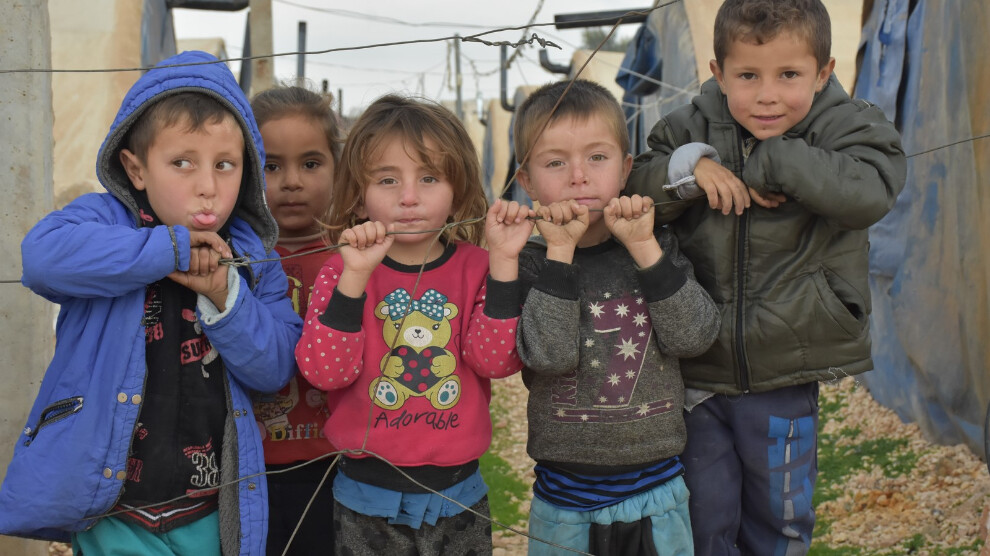Afrin IDPs in Shehba face a humanitarian crisis due to the embargo
Afrin IDPs in Shehba, who are living under an aggravated embargo imposed by the Damascus government, are facing a humanitarian crisis.
Afrin IDPs in Shehba, who are living under an aggravated embargo imposed by the Damascus government, are facing a humanitarian crisis.

Afrin people displaced by the Turkish invasion of their land have been living in the neighboring Shehba Canton for over three years under challenging conditions. The IDPs living in tents can protect themselves from neither the summer heat nor the winter cold.
The Damascus government, implementing vicious policies against Afrin IDPs and the local people in the region, closes all highways across Shehba and blocks the delivery of medicines and fundamental needs to the canton, putting the lives of thousands of civilians on the line.

Recently, more and more people are falling ill with seasonal diseases due to the temperature rise and lack of coolers and air conditioners. International organisations and institutions responsible for defending immigrant rights continue to remain silent against these conditions.
Doctors in Shehba spoke about the health problems and humanitarian crisis in the region and stated that the health centers operating in the region are equipped for only a restricted number of diseases such as gastritis, diabetes, high blood pressure and heart disease. Stressing that they do not have adequate medicines for ill children and the elderly, doctors said that ambulances are also disallowed to transfer patients to the hospitals in Aleppo.

Afrin IDPs who have been resisting harsh living conditions, serious health problems and high temperatures in nylon tents spoke to ANHA about their situation.
Şadiya Necar living in Berxwedan Camp said, “This is the 4th year we are staying in the camp. We are living under hard conditions. We can protect ourselves from neither hot nor cold weather. Moreover, an embargo has been imposed on the region. Transportation of medicine, fuel and food is blocked. It is 40-42 degrees out here. The number of patients, especially children, increases day by day. We have neither a cooler nor an air conditioner.”
Remarking that the international organisations do not fulfil their ethical responsibilities for the immigrants living in camps, especially for those living in Shehba, Şadiya Necar added, “It is a shame that so-called defenders of human rights remain silent. They only listen and record the demands of civilians and do nothing more in practice.”

‘Health centers have no medicine due to the embargo imposed by Damascus’
“We go to health centers for medication and get shocked in the face of what we see there; the health centers have got no medicine. Due to the embargo imposed by the Damascus government, delivery of the medicines into the region is disallowed. The international organisations provide aid and medicine only for families of the gangs in occupied regions and Idlib. This proves the mentioned gang organisations’ collaboration with the Turkish state in the genocide of Kurdish people” continued Şadiya Necar.
Stressing that they will continue to resist the challenges, Necar lastly said, “All great states claiming to defend human rights should know that Afrin IDPs are honourable people. We will never surrender to the vicious policies and we will resist till the end. We will struggle until the liberation of Afrin and will certainly return to our land one day.”
Likewise, Hisen Hebeş living in Berxwedan Camp stated that they experience challenging conditions in every aspect and pointed out the urgency of health and water needs of the people living in the region. He noted that the international organisations closed their eyes to the pain suffered by the immigrants.
‘The Damascus government has aggravated the embargo in the last one month’
Expressing that the embargo blocks the delivery of fundamental needs such as fuel, food, formula milk as well as water and medicine, Hisen Hebeş condemned the silence of international organisations in the face of the Damascus government’s policies against the IDPs in Shehba.

Dr Osman Şex Isa, manager of Avrin Hospital, stated that the Damascus government’s policies on the region will cause a humanitarian disaster in the near future and continued, “The Damascus government denies medicine and required health equipment access the region. The inaction of the interested parties will bring about great humanitarian disasters. Such policies of the Damascus government are not new; in this sense, we are not surprised. However, they have aggravated the embargo in the last one month.”
Pointing out the ever-increasing cases of malaria, infection, diabetes and heart disease due to temperature rise in summer, Dr Osman Şex Isa said, “Since the Damascus government closed the border crossings, our medicine stock has decreased at the rate of 80 percent. Every day, hundreds of people go to free hospitals and health centers for treatment. International and regional conflicts endanger the health of people.”
The doctor informed that Heyva Sor a Kurd (the Kurdish Red Crescent) has been able to transfer only 2 percent of patients to the hospitals in Aleppo, adding, “International organisations should put pressure on the Damascus government to allow the delivery of medical supplies into the region and transfer of patients to Aleppo.”

Hevin Hisen, co-chair of Afrin Region Health Committee, pointed out that the majority of Shehba population consists of Afrin IDPs who have been living under challenging conditions for over three years.
Condemning the international organisations which avoid their responsibilities for Afrin immigrants, Hevin Hisen said, “We are Syrian people. In this sense, the Damascus government is responsible for the humanitarian conditions of the people living in Syrian territory. However, on the contrary, we face a government which imposes an aggravated embargo and blocks the delivery of medicine and fundamental humanitarian needs.”
Hevin Hisen stated that they are making the utmost effort to support Afrin IDPs but they have inadequate opportunities due to lack of medical equipment.
